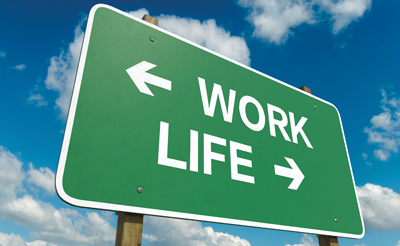
Recalibrating the Scales
Work/Life Balance
By Diane M. Calabrese / Published December 2018

Frequent references to balance between work and life indicate how demanding work can become. Work is part of life, after all.
How do members of our industry prevent the balance from tipping heavily toward the scale of work? They are realistic. They know why they work. They know how to re-equilibrate, and they enjoy what they are doing.
“Being entrepreneurial is about watching a high risk become a rewarding daily routine that fills both a customer need and employment needs,” says Beth Borrego, vice president of See Dirt Run! Inc. in Germantown, MD. “It makes me want to build more things…Never stop dreaming and growing.”
It takes a commitment of both time and energy to follow the dreaming with the growing. So being realistic about hours that must be invested in a business counters any lament about other activities for which there is no time.
That does not mean a new business owner should devote all waking hours to work. Each person will find her or his own strategy for putting the scale of life in balance with the scale of work. Borrego’s method?
“I’m not so sure I would define it as a particular method, because when the business is new, you pour as much time into it as you can,” says Borrego. “But once the business finds its feet, you sort of have to limit yourself to the operational hours as much as you can. It’s never easy, and it doesn’t work 100 percent; but if you try, you’ll recapture your life.”
Borrego says there’s nothing unique about the non-work activities she most enjoys. “Like anyone else, I value down-time, family time, and vacation as special,” she says. “It doesn’t matter what you do for a living.”
Moreover, explains Borrego, it’s not as though there is no intersection between work and non-work activities. “Friends outside the industry ask what you do, just like you ask what they do,” she says. Discussions between friends may even lead to business contacts. “Referrals happen in this way,” says Borrego.
“As for industry friends, you have to find a comfort zone there, too,” explains Borrego. “How close do you want people to get? It depends. We have some very close friends and many acquaintances.”
Some of the industry friends may be customers. There’s a great deal to balance even in free time.
“We have been fortunate to work with some fantastic customers over the years,” says Kimberlee Handl, president and CEO of North American Pressure Wash Outlet LLC in Gainesville, GA. The relationships begin in a number of ways. They might start online, move to email and phone calls, and then to dinner, she explains.
Industry conventions help facilitate face-to-face meetings, says Handl. “And because many of the organizations are family friendly, we have met the extended members of the customer’s family as well. We are truly fortunate to have many customers who become friends.”
Side trips to visit customers over a quick lunch or a customer chat over a cold beverage on a deck supports friendly interaction and provides a break from the intensity of work. Handl’s daughter, now a college freshman, has strongly endorsed the combination work/social travels she has made with her parents.
“Our daughter has zero interest in pressure washing,” says Handl. “But she does acknowledge that we really do get to work with some genuinely nice people. And I have to agree.”
One of the abundant plusses of working in our industry is the chance to meet so many people. “I think what I most enjoy is the opportunity to talk to new people every day and hopefully help solve a problem that makes the customer’s world a little better,” says Handl.
In other words, even work is not all work. Neither is it play, however. And at some juncture, everyone must take a break—and know when to take it.
Pausing
“With the unlimited access that our customers have to us via social media platforms, sometimes it’s necessary to take a mental break,” says Handl. “I can’t say that we manage to turn it all off, but we do make a big effort to disconnect.”
The determined breaks from technology are refreshing. They also free up some concentrated time. “These time-outs are very often spent planning for the business in a more relaxed atmosphere,” says Handl.
It is imperative to maintain a healthy work-life balance, says Handl. But it’s a “tricky” thing to accomplish, and it often takes real creativity in addition to effort.
Over their years in business, Handl and her husband, co-owner Tracy Handl, have developed a few strategies. “We actively participate in the operation of the business, and there are times it can be exhausting,” she explains.
“In the cleaning industry there are times, like spring, when the workloads aren’t conducive to vacations or breaks,” explains Handl. “There are times, fortunately, when the industry takes a collective breath. This can be during the dead of winter, July 4th holiday, or at the end of the calendar year.”

Photo by iStockphoto.com/abluecup
It’s during those slower intervals that the Handl family schedules time away. “It’s important to be able to decompress and disconnect from the business to reset,” says Handl.
“We have also worked to be more flexible with ourselves in terms of work hours,” says Handl. She notes that eight-hour days are not the norm in the world of instantaneous communication, anyway. “So we go to the chorus recitals, the volleyball games, and the swim meets because those moments can’t be replaced.”
Handl says her husband has a weekly card game with friends who also own businesses in the area. “They bounce ideas off each other as many of them have expertise in complementary areas of business.” It’s a “mental reset” and an opportunity to do a bit of networking—just “not at the table” where the game is played.
“We also try to add on a day to out-of-town conventions, events, etc.,” says Handl. For instance, she and her family have added a day to their PWNA itinerary to go fishing.
Recalibration and Resources
“I think maintaining a work-life balance has a lot more to do with goals than methods,” says Brian Carter, president of Armstrong-Clark Company in Sonora, CA. “Once you decide what your goals are in work and in your personal life, everything else follows. The goals drive the plan. The plan drives the steps you take day to day. The trick is keeping your goals in front of you and remaining focused every day. It’s easy to get distracted.”
Non-work activities are important, says Carter. “The ability to focus on the other aspects of life, especially family and personal projects” is what he most enjoys about non-work hours. “Taking time away from work will also help keep focus at work. It allows me to walk in every day with a clear perspective on what needs to get done.”
An approach Carter uses to bring balance to the parts of his life is to combine them when possible. “I joke that we travel a lot, but we really never go on vacation,” he explains. “For example, this past August I needed to be in Chicago for four days. I took an extra day for additional customer visits, but I still had three days to spend with my family to tour the city.”
Moreover, like Borrego and Handl, Carter savors the day-to-day of his profession. “Working with and helping other people” is something he
enjoys greatly.
“We live in a world where we usually get a voice menu we need to navigate before getting put on hold or having to wait for a call back,” says Carter. It’s gratifying to be able to hear the voices of his company’s customers who are happy to have a person answer the phone and also answer their questions, he explains.
There will be times when it does not seem possible to move toward both professional and personal goals—at least not in parallel—says Carter. And it’s a difficulty that many of us have had to address or will have to address.
When one thing must simply be done before another, such as saying goodbye to a loved one, recovering from an illness on the personal side, or rebuilding a business after a natural disaster on the professional side, the circumstance is what it is. Embrace the situation and see it through.
A short guide to work-life balance published by the Mayo Clinic on June 29, 2018, can be accessed at www.mayoclinic.org/healthy-lifestyle/adult-health/in-depth/work-life-balance/art-20048134, offers excellent tips for how to reclaim control if one senses the scales of life and work are out of balance. There are suggestions on how to set limits (e.g., saying no sometimes, reducing email, making prioritized lists) and on how to care for oneself (e.g., healthy diet, exercise, sleep).
Keeping a life in balance during an intense workday is as simple as being aware. Take a deep breath. Look out the window. Drink some water. Take a short walk. Recall the big picture: Life IS about more than work.





